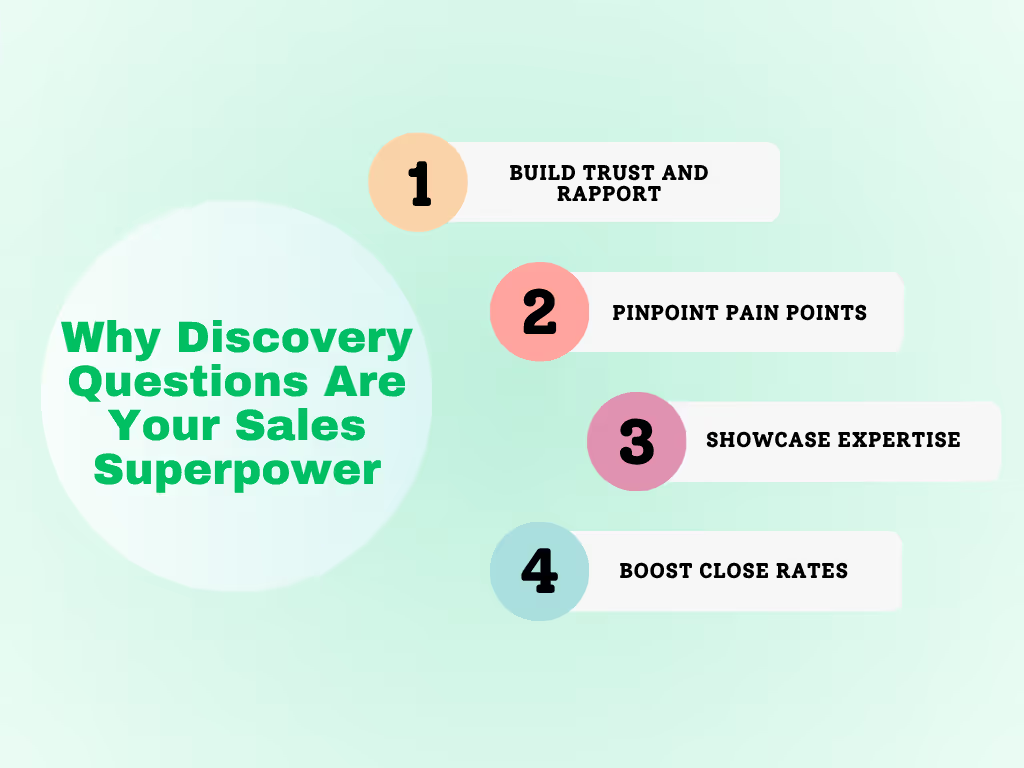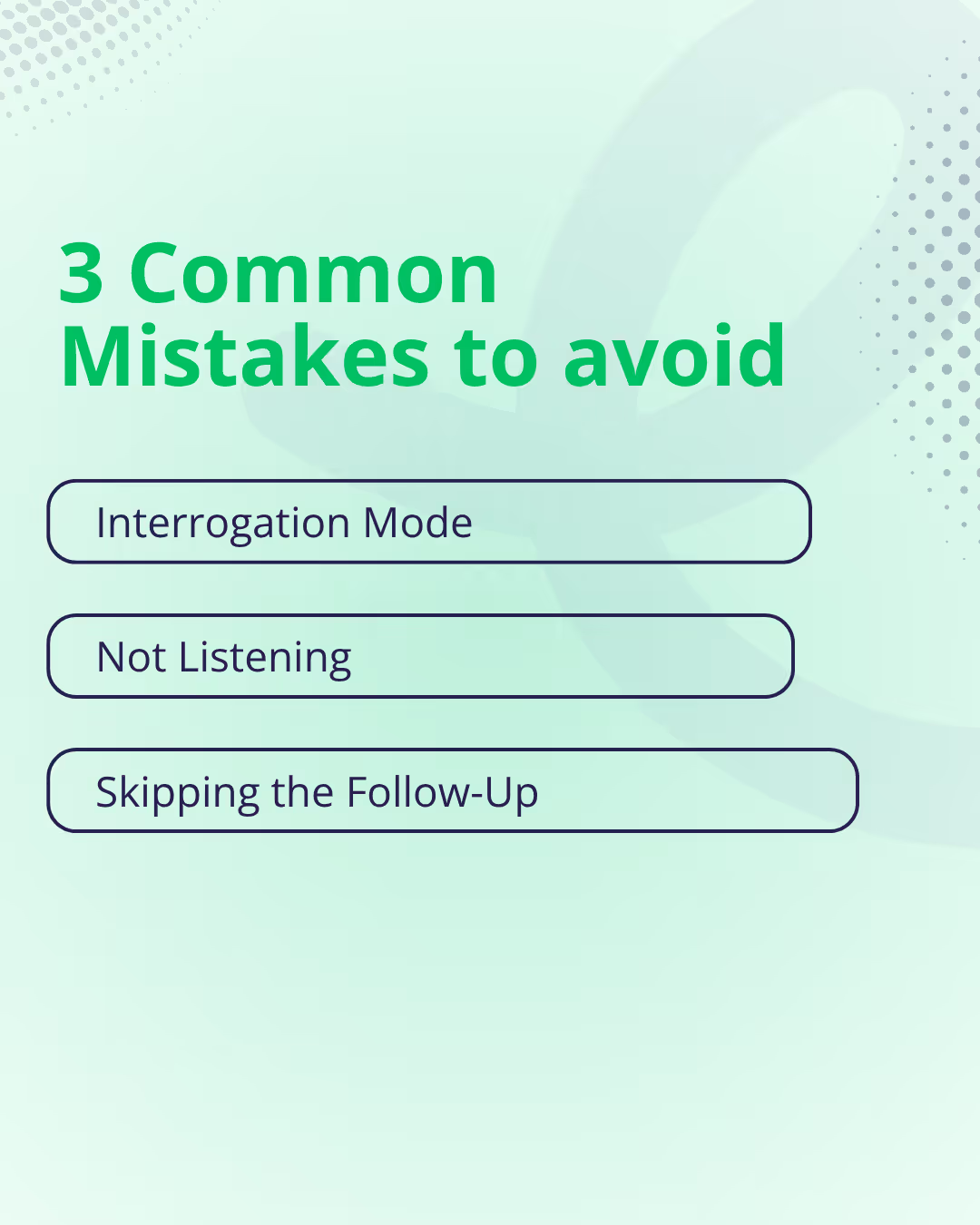“If you could fix one thing about your business instantly, what would it be?”
If you’ve ever felt a little embarrassed saying that out loud on a discovery call, you're not alone. Too often, sales discovery questions end up sounding like awkward first-date lines, scripted, stale, and painfully predictable.
But here’s the thing: the right questions don’t just fill time, they unlock insight. A great discovery question doesn’t just get the prospect talking; it makes them think, reflect, and open up. It shifts the conversation from small talk to strategic value.
So how do you move beyond the cliché and spark real dialogue?
Let’s dive in.
Why Discovery Questions Are Your Sales Superpower

A Discovery call isn't just a box to tick on your CRM; it's your golden opportunity to unearth crucial insights that will help you craft a perfectly tailored solution for your prospect. Think of yourself as an archaeologist, and each question is a brush stroke revealing more of the hidden artifact. The goal is to go beyond the surface and truly understand their world.
By honing your discovery questioning skills, you can:
- Build Trust and Rapport: Genuine curiosity fosters stronger relationships, laying the groundwork for long-term partnerships.
- Pinpoint Pain Points: Deep dives into their challenges allow you to position your solution as the ultimate remedy.
- Showcase Expertise (Without Bragging): Thoughtful questions demonstrate your understanding of their industry and challenges, enhancing your credibility.
- Boost Close Rates: The better you understand their needs, the more precisely you can align your offering, directly impacting your sales success and revenue.
Learn how to structure a winning discovery call
Framework Spotlight: Guiding Your Discovery Journey
To structure your discovery calls effectively, consider leveraging established methodologies. Two popular frameworks are:
- SPIN Selling (Situation, Problem, Implication, Need-Payoff): This method guides you through understanding the current situation, identifying problems, exploring the implications of those problems, and finally, highlighting the value of your solution.
- MEDDIC (Metrics, Economic Buyer, Decision Criteria, Decision Process, Identify Pain, Champion): MEDDIC focuses on a more comprehensive understanding of the prospect's internal landscape, including their metrics for success, key decision-makers, and pain points.
The Art of Asking: Crafting Questions That Resonate
Not all questions are created equal. Some elicit unenthusiastic, one-word responses, while others spark genuine, insightful conversations. Here are some sales conversation tips to ensure your questions hit the mark:
Be Specific, Yet Open-Ended
Avoid generic questions that lead to vague answers. Instead, focus on specific areas while still allowing for detailed responses.
- Instead of: "What’s your biggest challenge?"
- Try: "When it comes to scaling your customer support team, what specific roadblocks have you encountered recently?"
Dig Deeper with Follow-Up Questions
Demonstrate active listening and a genuine desire to understand by asking insightful follow-up questions.
- Initial Question: "You mentioned scalability issues."
- Follow-Up: "Can you share more about how those scalability issues are impacting your team's efficiency and customer satisfaction on a daily basis?"
Frame Questions Around Their Goals
Show that you're invested in their success by aligning your questions with their aspirations.
- Example: "What would success look like for your sales team in the next fiscal quarter, and what are the key metrics you'd be tracking?"
Use Humor to Break the Ice (Carefully!)
A touch of humor can make the conversation more natural and less formal.
- Example: "What's the one thing about your current reporting process that makes you want to throw your laptop out the window?"
Incorporate Framework-Specific Questions
If you're using a framework like SPIN or MEDDIC, weave its principles into your questions.
- SPIN Example (Implication): "If this challenge with lead qualification isn't resolved, what wider impact do you foresee on your overall marketing ROI and sales pipeline for the year?"
- MEDDIC Example (Decision Criteria): "Beyond budget, how does your team typically evaluate potential solutions like ours? What are the key criteria and non-negotiables you prioritize during the selection process?"
7 Sales Discovery Questions That Work Like Magic
Here are seven powerful discovery questions, categorized for clarity, that will encourage your prospects to open up:
Process-Focused Questions
These questions help you understand their current operations and identify inefficiencies.
- "Can you walk me through your current process for [specific task, e.g., onboarding new clients, managing inventory, generating sales reports]?"
- This question helps uncover inefficiencies, manual efforts, and potential pain points within their existing workflows.
- This question helps uncover inefficiencies, manual efforts, and potential pain points within their existing workflows.
- "What's prompting you to explore solutions like ours now? Has anything specific changed recently that has increased the urgency?"
- Understanding their immediate motivations and any recent triggers provides crucial context for their urgency and priorities.
- Understanding their immediate motivations and any recent triggers provides crucial context for their urgency and priorities.
Goal-Oriented Questions
These questions reveal their aspirations and help you align your solution with their vision of success.
- "If budget, time, and resources weren't a concern, what would be your ideal solution for [specific problem area]?"
- This question helps uncover their true dream scenario and allows you to understand their ultimate vision without limitations.
- This question helps uncover their true dream scenario and allows you to understand their ultimate vision without limitations.
- "What's your realistic timeline for implementing a solution like this, and what steps do you envision between now and then?
- This helps gauge their sense of urgency and allows you to set realistic expectations for the sales cycle.
- This helps gauge their sense of urgency and allows you to set realistic expectations for the sales cycle.
Stakeholder and Experience Questions
These questions help you navigate the internal landscape and learn from their past experiences.
- "Who else within your organization will be involved in the decision-making process for a project like this, and what are their primary concerns or objectives?"
- Identifying all stakeholders early helps you anticipate potential roadblocks and tailor your message to different decision-makers.
- Identifying all stakeholders early helps you anticipate potential roadblocks and tailor your message to different decision-makers.
- "Looking back, what's worked well for you when adopting new technologies or processes in the past? Conversely, what hasn't worked, and why do you think that was?"
- Learning from their past successes and failures allows you to understand their preferences and avoid repeating mistakes.
- Learning from their past successes and failures allows you to understand their preferences and avoid repeating mistakes.
- "How do you currently measure success for this particular project or initiative? What key performance indicators (KPIs) are most important to you?"
- Aligning your solution with their measurable goals demonstrates your understanding of their business objectives and helps you present value in their terms.
Common Mistakes to Avoid

Even the most brilliant sales discovery questions can fall flat if delivered poorly. Steer clear of these common pitfalls:
Interrogation Mode
Don't rapid-fire questions like a detective. Make it a natural, two-way conversation.
- Instead of: A list of questions.
- Try: "I'm curious to know more about how your marketing team currently handles lead nurturing, could you walk me through your process and any challenges you're facing there?"
Not Listening
If you're already formulating your next question while they're speaking, you're missing valuable insights. Practice active listening.
- Instead of: Tuning out.
- Try: "You just mentioned a challenge with data integration, can you elaborate on how that specifically impacts your reporting accuracy?"
Skipping the Follow-Up
A surface-level answer is just the beginning. Always probe deeper to uncover the root cause.
- Initial Answer: "Our previous CRM didn't work out."
- Follow-Up: "Why do you think that particular CRM didn't meet your team's needs, and what were the main frustrations you encountered?"
Pro Tip: Apply the "5 Whys" technique to drill down into the root causes of challenges. For example: "Why is lead conversion a challenge?", "Why are leads not engaging with our content?", "Why is our content not resonating?" and so on, until you get to the core issue.
Putting It All Together: A Sample Dialogue
Here’s an example of how to weave your discovery questions into a smooth, engaging conversation:
You: "Thanks so much for taking the time to chat today, [Prospect's Name]. To kick things off, could you walk me through how your team currently handles new customer onboarding?"
Prospect: "Well, we use a mix of manual steps and some automated emails, but it feels a bit disjointed right now."
You: "Interesting. When you say 'disjointed,' what's the biggest challenge or bottleneck you're facing with that current approach?"
Prospect: "We're spending too much time on administrative tasks, and it's leading to inconsistent customer experiences early on."
You: "Got it. When you say 'inconsistent customer experiences,' what specific impact is that having on your customer retention rates or overall satisfaction scores?"
Prospect: "We've seen a slight dip in our 30-day retention, and we're getting more support tickets related to initial setup issues."
You: "That makes sense. If you could streamline one part of that onboarding process instantly, what would it be, and why?"
And so on. The key is to follow their lead, ask clarifying questions, and genuinely demonstrate that you care about their answers and their business.
Take Your Discovery Calls to the Next Level
Now that you're armed with these powerful sales discovery questions and strategies, it's time to put them into practice. Remember, the ultimate goal is to keep your prospects engaged, uncover their true needs, and gather the essential insights you need to present a solution that genuinely addresses their challenges and helps them achieve their goals. Check this out to take your discovery calls to the next level.
Ready to transform your sales conversations from awkward small talk into meaningful, deal-closing dialogues?
Book a demo with the Pepsales AI team today and discover how our solutions can empower you to ask the right questions and achieve the right results.
Master the art of sales discovery questions and turn mundane calls into magical connections. With the right approach, your discovery calls won't just be productive, they might even be a little fun.
FAQ:
Q1: Why are discovery questions important in sales?
They reveal a prospect’s true needs, pain points, and goals and help you tailor your solution, build trust, and close more effectively.
Q2: Why use open-ended questions in discovery calls?
Open-ended questions spark detailed responses. They help uncover deeper insights than yes/no questions, leading to more meaningful conversations.
Q3: How do SPIN and MEDDIC help with discovery?
These frameworks offer structured questioning to ensure you explore all critical areas like pain points, decision criteria, and buyer motivation.
Q4: What’s a common mistake to avoid?
Avoid sounding like an interrogator. Make it a two-way conversation by listening actively and asking for thoughtful follow-ups.
Q5: How does Pepsales AI support discovery?
Pepsales AI guides reps with smart prompts and real-time insights, helping you ask better questions and understand prospects faster










.avif)
.avif)
